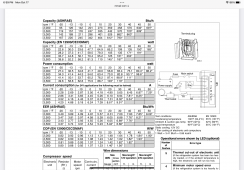acdoctor
Solar Enthusiast
My 10 cf 120 volt fridge in the RV developed a leak in the evaporator.
I replaced it with a 12 volt inverter model. It uses about 0.5 kw per day. It also allows me to turn off the inverter. Now I only turn the growatt on when I need it.
New fridge cost about 3 times the price of a 120 volt model but I can only fit 2 kw of panels on the roof.
I replaced it with a 12 volt inverter model. It uses about 0.5 kw per day. It also allows me to turn off the inverter. Now I only turn the growatt on when I need it.
New fridge cost about 3 times the price of a 120 volt model but I can only fit 2 kw of panels on the roof.




